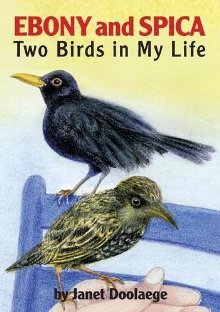In Ebony and Spica: Two Birds in My Life, Janet Doolaege tells about a blackbird and a starling who were rescued as fledglings and spent long and happy lives as part of her household. It might seem like there wouldn’t be much of a story here, but the author’s keen observations and skillful description make this brief memoir an entertaining read.
The writing abounds with vivid imagery and information about birds, the kind of knowledge that comes only through close observation:
An aggressive blackbird looks very different from an aggressive starling. Ebony in an angry mood would look like a horizontal missile, all feathers on his head flat and his beak pointed forwards. . . . An enraged starling, on the other hand, is a vertical challenger with crown feathers sticking straight up.
Bird lovers will enjoy the antics of these feathered sweethearts, who worm their way into the hearts of Doolaege and her husband. The latter occasionally loses patience with Spica’s dinner-table incursions. My husband and I share our home with a budgie, so I know how birds can take over a household and how annoying they can sometimes be. I had quite a few moments of recognition while reading Ebony and Spica.
Some think of birds as neglible creatures. Anyone who has lived with them knows they’re intelligent and sensitive. but even bird lovers might not think of starlings and blackbirds as beautiful. Doolaege reveals their beauty—Ebony “with a fine gold ring around each large black eye” and Spica “with his feathers slightly puffed out like miniature cockle shells.”
The story of the birds inevitably allows readers into the author’s daily life. I enjoyed visiting a world not fraught with melodrama or darkened by disaster, a world where people with ordinary problems find contentment in their day-to-day experiences. The author adopted Ebony and Spica because they would have perished otherwise, but she concludes that birds cannot live a full life among human beings. I understand her arguments but think a bird, wild or domesticated, could meet a far worse fate than life in a French farmhouse with other birds, cared for and loved by compassionate human beings.








Leave a Reply
Want to join the discussion?Feel free to contribute!